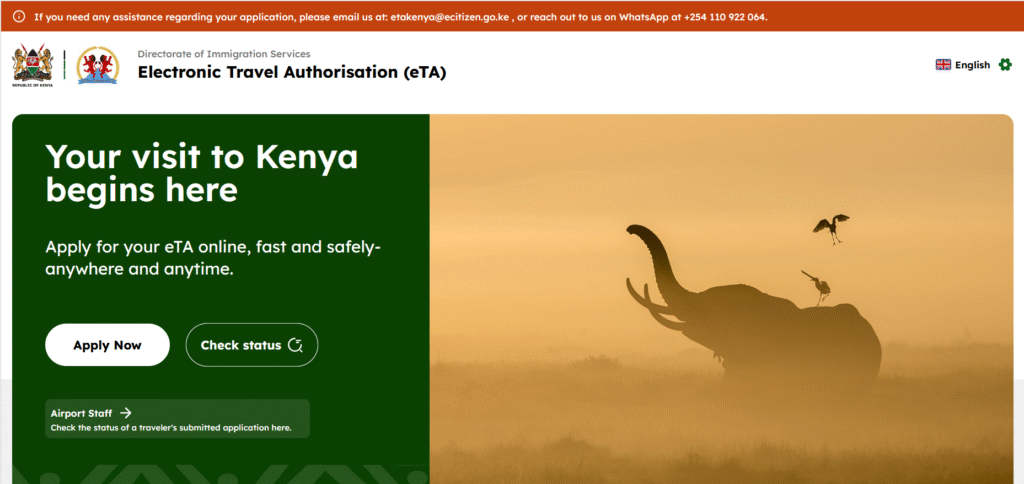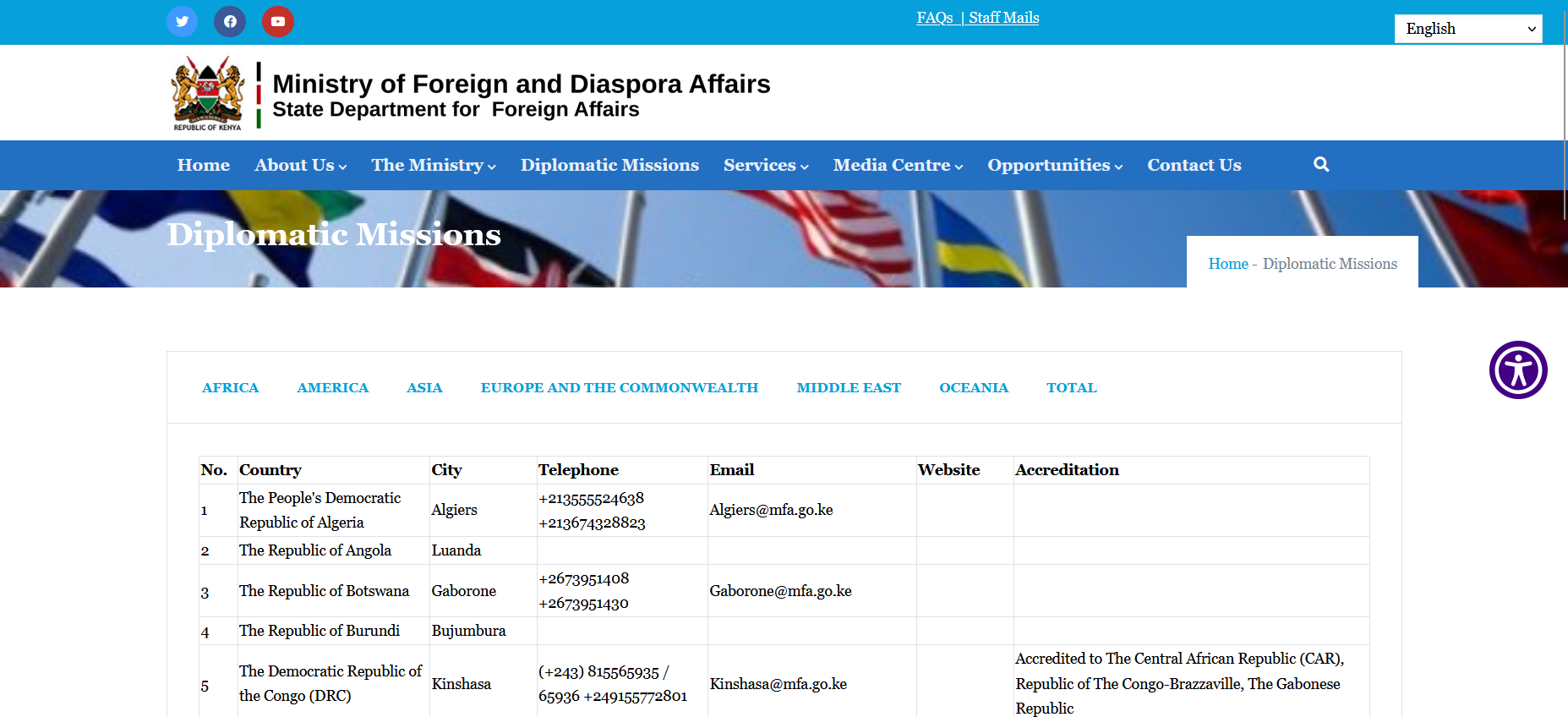It is crucial to understand the differences between the Kenya ETA and the previously used eVisa system, as this ensures compliance with entry regulations.
The Kenyan government has implemented updates to its travel authorization process, making it essential for visitors to stay informed about these changes.
The Kenya ETA, or Electronic Travel Authorization, streamlines entry requirements by allowing travelers to apply online in advance and receive approval electronically.
This system replaces the eVisa, which required more extensive documentation and often involved longer processing times.
With the ETA, individuals benefit from a quicker, more efficient process that reduces wait times and simplifies entry into Kenya.
NOTE: It’s important to review the most up-to-date guidelines on the Kenya immigration website to confirm eligibility and avoid complications during the travel planning process.
What is the Kenya ETA?
The Electronic Travel Authorization (ETA) is Kenya’s latest travel documentation system, implemented to simplify how visitors enter the country.
Introduced on January 1, 2024, the Kenya ETA replaced the eVisa as part of the government’s push toward a more streamlined and efficient border control process.
The Kenya ETA is mandatory for all non-Kenyan travelers, including children and infants. However, citizens of Kenya and the East African Community (EAC) Partner States (like Uganda and Tanzania) are exempted.
The Kenya ETA allows entry for:
- Tourism (exploring the savannahs, beaches, or wildlife parks)
- Business trips (attending conferences or meetings)
- Transit through Kenya to another country
The process is fully digital: travelers must apply through the official platform (www.etakenya.go.ke), providing basic documents and a processing fee.
Previously Used Kenyan eVisa
Before the ETA was introduced, Kenya used an eVisa system designed to allow travelers entry into the country.
The Electronic Visa was an online document that replaced the need for a physical visa stamp. While revolutionary at the time of its launch, the Kenyan eVisa had certain issues that the ETA aims to address.
The eVisa allowed entry for multiple purposes, including:
- Single-Entry Visas for one-time visits
- Multiple-Entry Visas for travelers with frequent trips
- Transit Visas
The eVisa system was operational until late 2023, after which the Kenyan government transitioned to the Kenya ETA.
Key Differences Between Kenya ETA and eVisa
The Kenyan ETA offers a more streamlined and efficient approach compared to the eVisa, serving as a pre-boarding authorization rather than a traditional visa.
![]() Unlike the eVisa, which had various restrictions based on nationality, the ETA simplifies the application process for a broader range of eligible countries.
Unlike the eVisa, which had various restrictions based on nationality, the ETA simplifies the application process for a broader range of eligible countries.
It is easier to obtain, with faster processing times and fewer required documents, providing travelers with a smoother experience.
Airlines can now digitally verify ETA authorization, further enhancing the check-in process.
The Kenyan government made this transition to streamline immigration procedures and adopt advanced technologies for better security and data management.
Application Process Compared
If traveling to Kenya, it’s important to understand the changes in the visa application process. The Kenyan ETA (Electronic Travel Authorization) has fully replaced the eVisa, offering a faster and more streamlined way to obtain travel approval.
Kenya ETA application procedure includes the following steps:
- Visit the official ETA website.

- Fill in an online form with personal details.
- Upload necessary documents.
- Pay the fee using a debit/credit card.
- Submit your application at least 3 days before your travel date.
- Receive your ETA via email after approval.
In contrast, the Kenya eVisa process, which is now phased out, often involved more extensive documentation and could result in longer processing times.
The shift to the ETA has simplified travel for visitors, making it quicker and easier to gain approval for entry into Kenya.
Validity, Duration of Stay, and Entry Conditions
Kenya’s current Electronic Travel Authorization system allows travelers a single entry and a stay of up to 90 days from the date of arrival.
While the ETA enables travel to Kenya, it does not guarantee entry — the final decision on whether to allow a visitor to enter the country is determined by immigration officers at the border.
![]() The ETA must be used within 90 days of its issuance, after which it becomes invalid. If a traveler exits Kenya and wishes to re-enter, they must apply for a new travel authorization.
The ETA must be used within 90 days of its issuance, after which it becomes invalid. If a traveler exits Kenya and wishes to re-enter, they must apply for a new travel authorization.
Previously, Kenya operated an eVisa system, which offered more flexibility in terms of validity and entry types — 30 days for Single-Entry Visas, with longer durations available for Multiple-Entry options.
Unlike the ETA, the eVisa served as a formal entry permission, though immigration officers still had the final say on whether a traveler could enter.
Transition From eVisa to ETA
![]() With the recent transition, it’s crucial to stay updated on visa policies. The Kenya eVisa system was replaced by the Electronic Travel Authorization (ETA) in January 2024.
With the recent transition, it’s crucial to stay updated on visa policies. The Kenya eVisa system was replaced by the Electronic Travel Authorization (ETA) in January 2024.
Still, existing eVisas that were issued before the transition and are still within their validity period remain effective for use until they expire.
New applications, however, must use the ETA system. Outdated eVisas will not be accepted at the border — so make sure you apply for the authorization well in advance of the trip.
Assistance at Kenyan Diplomatic Missions
If you have additional questions or require further assistance, you can contact the Kenya Embassy or Consulate in your country.
They can provide detailed information, clarify visa requirements, and guide you through the application process.
A complete list of Kenyan diplomatic missions worldwide is available on the Ministry of Foreign Affairs official website at https://mfa.go.ke/diplomatic-missions.

Frequently Asked Questions About Kenya ETA
- Do I still need a Kenya eVisa to travel in 2025?
No, the eVisa is no longer required; most visitors must have a Kenya ETA.
- Can I get the Kenya ETA on arrival at the airport?
No, the ETA must be obtained in advance through the official online portal.
- Is the ETA linked to my passport digitally?
The Kenya ETA is electronically tied to your passport and verified upon arrival by immigration officers.
- Can I extend my stay in Kenya with an ETA?
Extensions may be possible but require approval from Kenyan immigration authorities while overstaying can result in penalties.
- Do children need a Kenya ETA?
Infants and children must have an approved ETA. Parents or legal guardians must complete the application on their behalf.
- What happens if my Kenya ETA application is denied?
If your Kenya ETA application is denied, contact the nearest Kenyan Embassy or Consulate to explore alternative visa options or clarify the reason for the denial.
Conclusion
The introduction of the Kenya ETA marks a significant step forward in simplifying travel.
By replacing the Kenya eVisa, the ETA offers a smoother and more efficient experience for visitors while enhancing security and streamlining entry processes.
As travel regulations continue to change, staying informed is the best way to prepare for traveling to Kenya.
Before your trip, always check the latest visa policies through official government channels to avoid complications.



